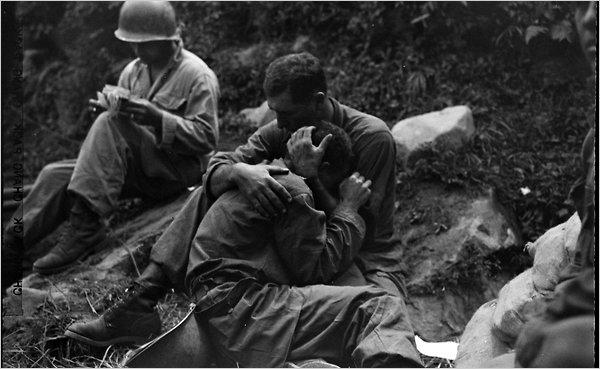Wartorn: 1861-2010
October 3, 2013 - 7:00 PM to 9:00 PM
Part of the mission of “Wartorn: 1861-2010,” an HBO documentary about post-traumatic stress disorder, is to see that its subject is taken seriously. It also has its share of quietly devastating, haunting scenes, echoes of the nightmares that veterans are bringing home with them from Iraq and Afghanistan. In one, cameras follow a soldier and his family on a shopping trip to Wal-Mart, where the crowds, noise and lights are too close a facsimile of Baghdad. Before our eyes he comes undone: his face goes rigid; he commands his daughter to stay close; he suddenly begins to stutter. The film’s most powerful scene is an interview with the mother of Noah Pierce, a soldier who committed suicide. Speaking in a tight monotone, she shows us the knife he used to impale his ID cards on the dashboard of his pickup (shoving the blade through his face on each card), the gun he used to shoot himself and the dog tag he held between the gun and his head, with its clean, round hole. Finally she reads his suicide note; if you look closely, you can see that it was written on the back of a certificate from the National Rifle Association attesting that he had passed a basic pistol course. “The inside had died so completely that he put that gun to his head and killed the outside as well,” she says.
“Wartorn” is the second documentary about veterans’ issues that the filmmakers Jon Alpert and Ellen Goosenberg Kent and the actor James Gandolfini have collaborated on. Cameras are granted an amazing intimacy with soldiers, their families and their survivors, and troops at all levels seem eager to sit down and talk with Mr. Gandolfini, right up to Gen. Ray Odierno, at the time the commander of American forces in Iraq. All of the officers who appear attest to the military’s acceptance of the reality of post-traumatic stress, after more than a century of denial, and its desire to help the estimated 30 percent to 40 percent of veterans who suffer with it. Some of the soldiers, or their survivors, have different stories to tell, like the father of Pfc. Jason Scheuerman. After noting on a psychiatric questionnaire that he had thoughts of killing himself, Private Scheuerman was given his weapon and sent back to his barracks, where he shot himself.
The film does not ask why our soldiers were sent to Iraq in the first place. The film never addresses that directly, but perhaps it’s implicit in the odd way that Noah Pierce’s mother is introduced. She’s standing by a window listening to a song that seems unlikely to be part of her usual playlist, Smile Empty Soul’s “This Is War”: “I drove in a car and flew in a plane/to come to your house and kick your door in.”
This screening will be followed by a discussion facilitated by Bill Cross, specializing in trauma therapy.
75 minutes – Free to the Public

